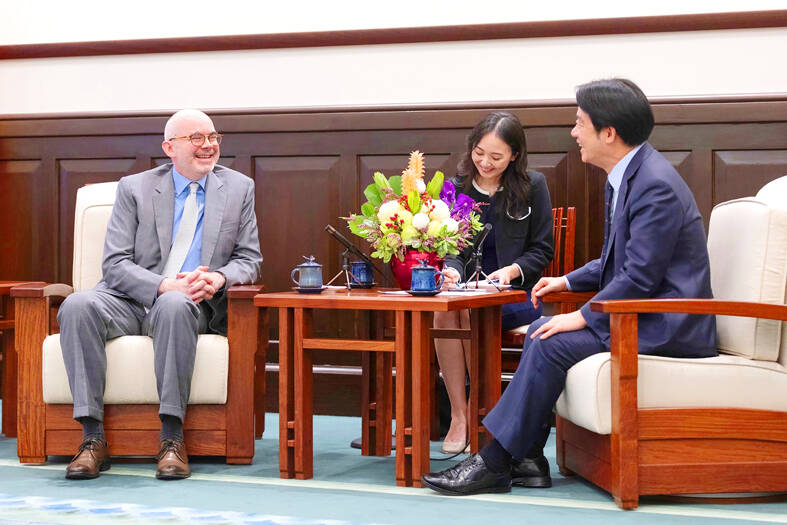The US would continue to help Taiwan bolster its ability to defend itself, American Institute in Taiwan (AIT) Director Raymond Greene said in a meeting with President William Lai (賴清德) at the Presidential Office in Taipei yesterday.
Greene assumed his new role as AIT director on Monday, serving as Washington’s top envoy to Taiwan.
“First of all, and the most important thing, the US will strongly support Taiwan’s self-defense capabilities,” Greene said.

Photo: Presidential Office via AP
“We both have common and long-term interests in peace and stability over the Taiwan Strait,” he added.
This support was in line with Washington’s long-standing policy guided by the Taiwan Relations Act, the Three Joint Communiques and the “six assurances,” he said.
Greene, who delivered his remarks in Mandarin, stressed the need to maintain peace and stability in the Taiwan Strait, describing it as a common and long-term interest of Taipei and Washington, and as extremely important for global security and prosperity.
He also said he was “confident that with the support of the global democratic community, we can safeguard Taiwan’s democracy.”
Calling Taiwan “a key partner” in promoting trade and the global supply chain resilience, Greene said he was looking forward to working with the Lai administration to advance bilateral economic, cultural and technological cooperation.
In his remarks, Lai thanked the US for showing its commitment to supporting Taiwan’s efforts to improve its security, mentioning in particular the 15 announcements of arms sales to Taiwan under the administration of US President Joe Biden.
Lai reiterated his pledge to maintain the “status quo” in the Taiwan Strait, despite increasing challenges posed by China, and expressed the hope of working closely with the US and other like-minded countries in support of the prosperity and development of the Indo-Pacific region.
As a career diplomat, Greene has previously been posted to Taiwan twice, including serving as deputy AIT director from 2018 to 2021.
Before arriving in Taiwan to take charge of the AIT, which represents US interests in Taiwan in the absence of official diplomatic ties, Greene was deputy chief of mission at the US embassy in Japan.

CHAOS: Iranians took to the streets playing celebratory music after reports of Khamenei’s death on Saturday, while mourners also gathered in Tehran yesterday Iranian Supreme Leader Ayatollah Ali Khamenei was killed in a major attack on Iran launched by Israel and the US, throwing the future of the Islamic republic into doubt and raising the risk of regional instability. Iranian state television and the state-run IRNA news agency announced the 86-year-old’s death early yesterday. US President Donald Trump said it gave Iranians their “greatest chance” to “take back” their country. The announcements came after a joint US and Israeli aerial bombardment that targeted Iranian military and governmental sites. Trump said the “heavy and pinpoint bombing” would continue through the week or as long

TRUST: The KMT said it respected the US’ timing and considerations, and hoped it would continue to honor its commitments to helping Taiwan bolster its defenses and deterrence US President Donald Trump is delaying a multibillion-dollar arms sale to Taiwan to ensure his visit to Beijing is successful, a New York Times report said. The weapons sales package has stalled in the US Department of State, the report said, citing US officials it did not identify. The White House has told agencies not to push forward ahead of Trump’s meeting with Chinese President Xi Jinping (習近平), it said. The two last month held a phone call to discuss trade and geopolitical flashpoints ahead of the summit. Xi raised the Taiwan issue and urged the US to handle arms sales to

BIG SPENDERS: Foreign investors bought the most Taiwan equities since 2005, signaling confidence that an AI boom would continue to benefit chipmakers Taiwan Semiconductor Manufacturing Co’s (TSMC, 台積電) market capitalization swelled to US$2 trillion for the first time following a 4.25 percent rally in its American depositary receipts (ADR) overnight, putting the world’s biggest contract chipmaker sixth on the list of the world’s biggest companies by market capitalization, just behind Amazon.com Inc. The site CompaniesMarketcap.com ranked TSMC ahead of Saudi Aramco and Meta Platforms Inc. The Taiwanese company’s ADRs on Tuesday surged to US$385.75 on the New York Stock Exchange, as strong demand for artificial intelligence (AI) applications led to chip supply constraints and boost revenue growth to record-breaking levels. Each TSMC ADR represents

State-run CPC Corp, Taiwan (CPC, 台灣中油) yesterday said that it had confirmed on Saturday night with its liquefied natural gas (LNG) and crude oil suppliers that shipments are proceeding as scheduled and that domestic supplies remain unaffected. The CPC yesterday announced the gasoline and diesel prices will rise by NT$0.2 and NT$0.4 per liter, respectively, starting Monday, citing Middle East tensions and blizzards in the eastern United States. CPC also iterated it has been reducing the proportion of crude oil imports from the Middle East and diversifying its supply sources in the past few years in response to geopolitical risks, expanding